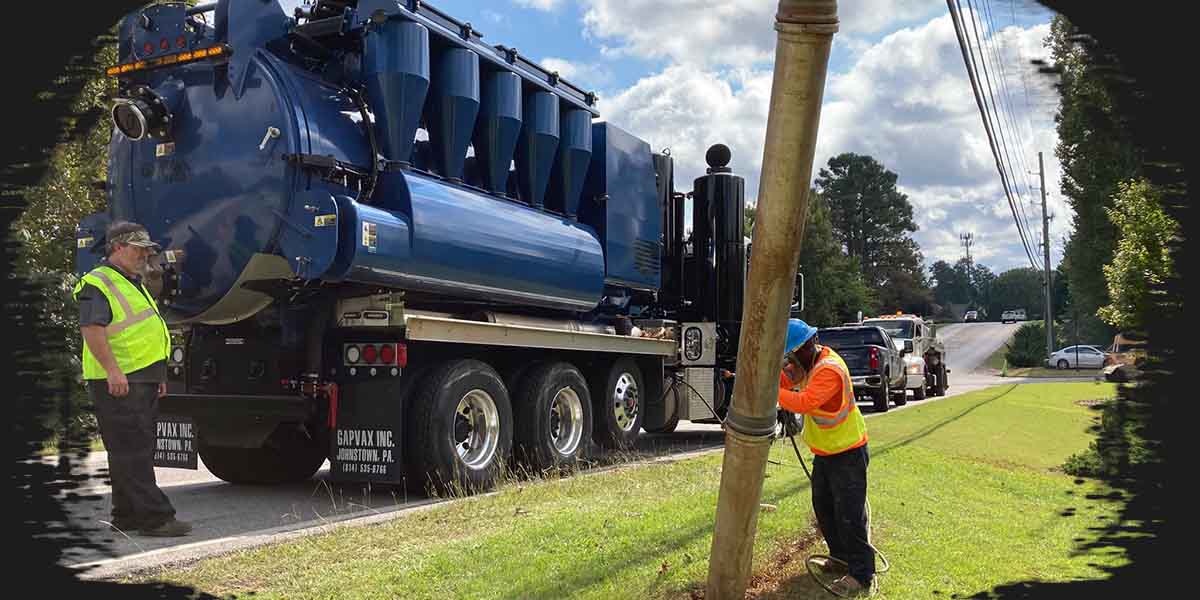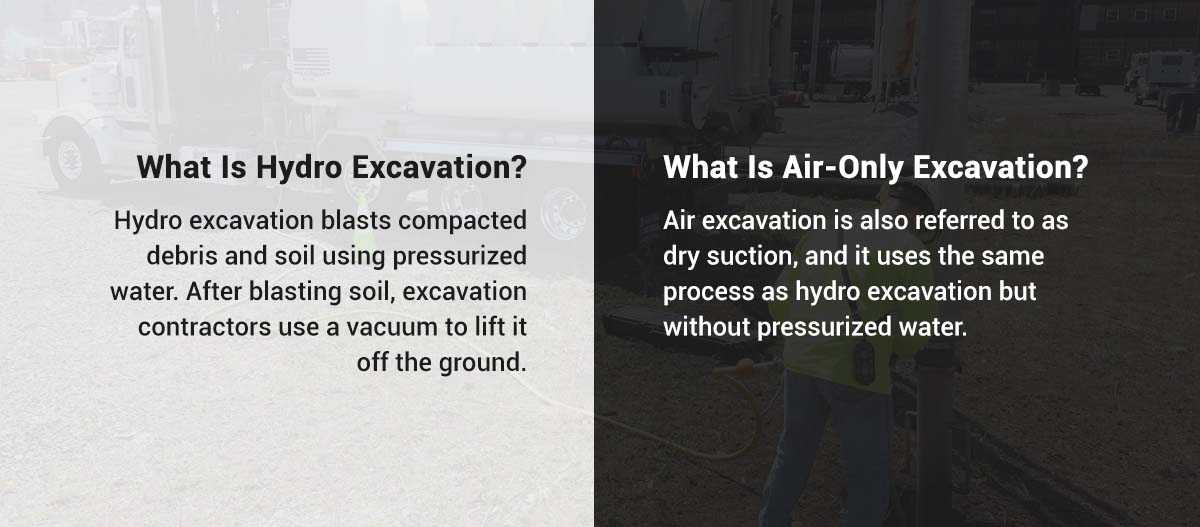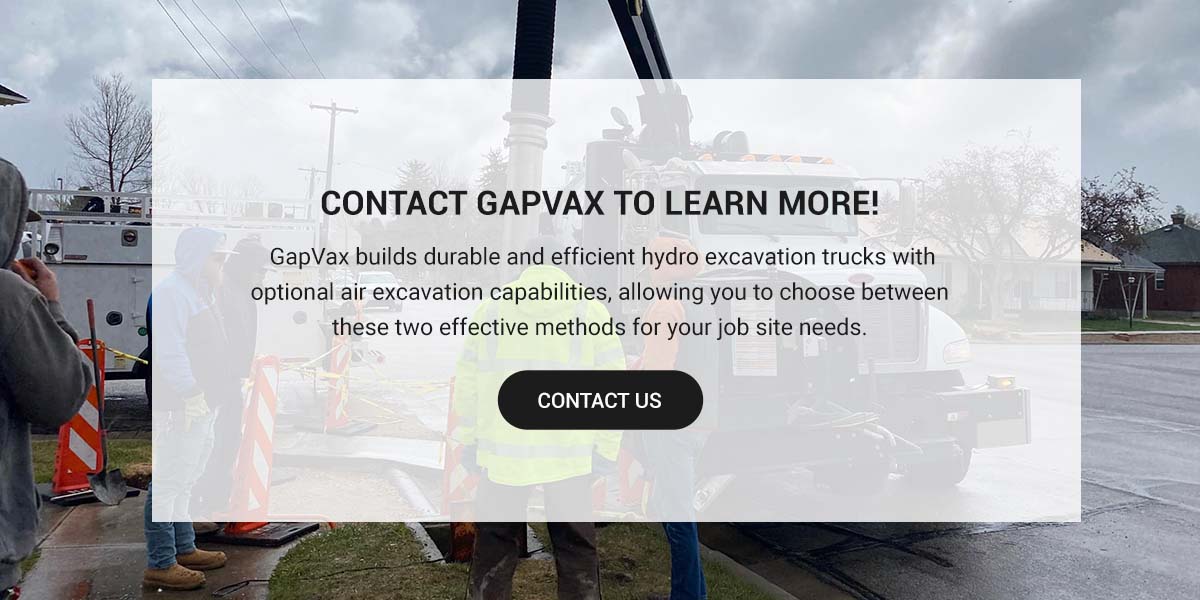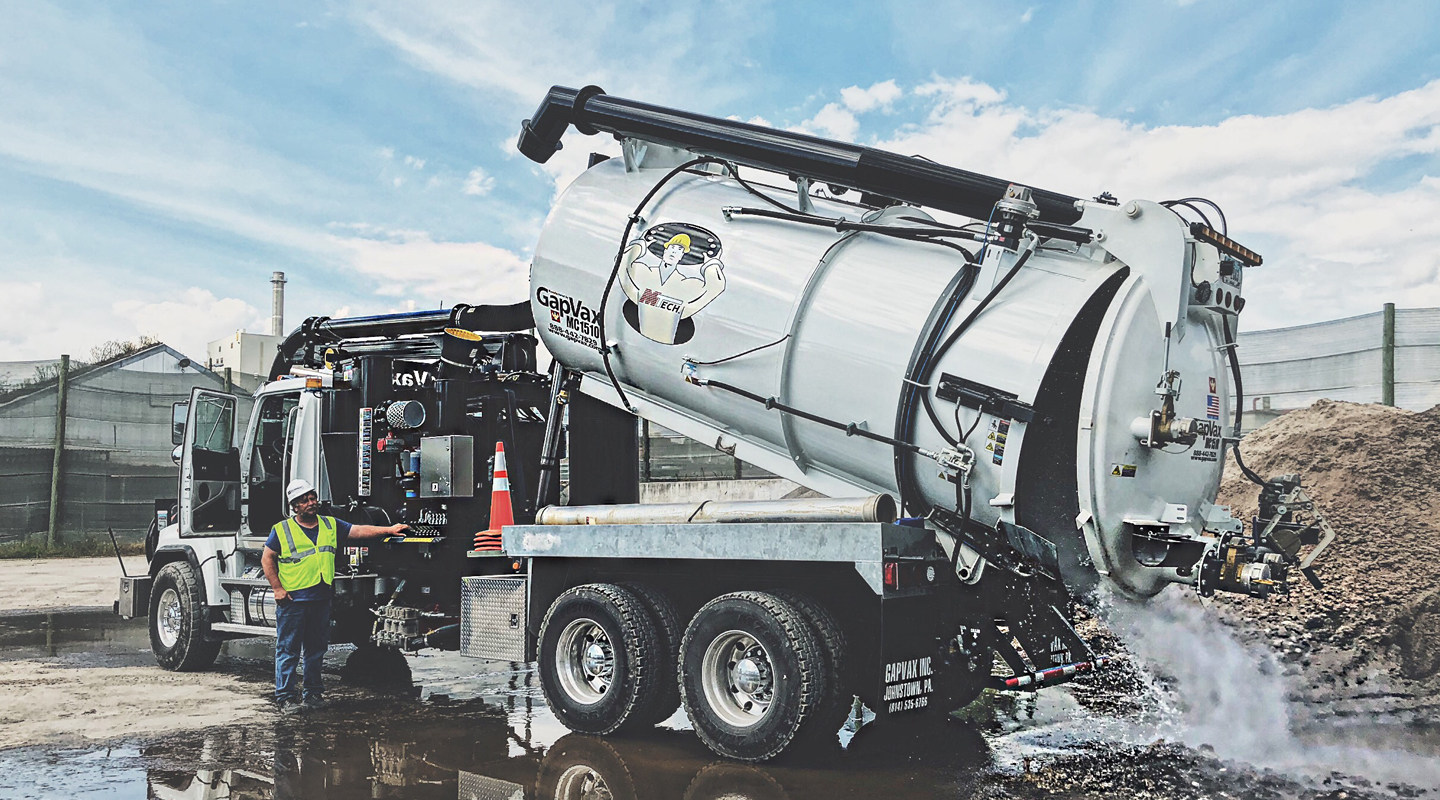
Hydro Excavation vs. Air Excavation
Published: Febraury 13th, 2023 | Author: Admin
Vacuum excavation uses compressed air or pressurized water to break soil and vacuum it into a debris tank. You can use vacuum excavation to effectively move soil on a job site and offload it in a separate location or use it as backfill on the job site. Understanding the differences between hydro excavation and air excavation can help you choose the best hydro vac truck for your operations.
What Is Hydro Excavation?
Hydro excavation, also referred to as water excavation, uses high-pressure water to break up compacted soil. After breaking up the soil, excavation contractors use a vacuum to lift the material into the debris tank. Each hydro excavation truck contains these components:
- Vacuum system
- Water pump
- A tank that holds excavated waste
Hydro excavation offers the following benefits:
Cost-Effectiveness
While traditional excavation methods require several industrial digging machines, such as dump trucks and backhoes, the hydro excavation method only requires one truck. Requiring less equipment makes hydro excavation a much more cost-effective option compared to conventional methods.
Versatility
Excavation contractors can perform hydro excavation on almost any ground type. This process is effective on frozen ground, clay and loose soil, making it a versatile alternative to conventional excavation methods. Hydro excavation is also an excellent method for sites that contain underground utilities and infrastructure.
Precision
Hydro excavation is typically a more precise process than traditional excavation. Hydro excavation trucks create less splashback and operate efficiently, allowing contractors to complete jobs faster than they could with traditional methods.
Safety
While the high-pressure water used on hydro excavation trucks (typically 2000 - 3000 psi) has enough power to break up soil, it is not enough pressure to damage most underground utilities.
Hydro excavation is also safer for the environment than traditional methods. Excavation can harm the environment through air emissions, waste generation and energy consumption, but hydro excavation reduces these impacts.
Efficiency
Hydro excavation is the most efficient type of vacuum excavation because of its speed. A hydro excavator unit can remove soil from sites faster than traditional excavation and air excavation methods can. This allows contractors to excavate effectively with less equipment and labor.

What Is Air-Only Excavation?
Air excavation is also referred to as pneumatic excavation, and it uses a similar process as hydro excavation but without pressurized water. This excavation method breaks up soil using compressed air. In most ground conditions, it takes more time to excavate using air than water. Air excavation is best for sites with softer soil, such as loamy sand, topsoil and various clay formations. While air excavation requires more time than hydro excavation, it still offers several benefits. Using air excavation to clear a site provides these advantages:
Cost-Effectiveness
Since air excavation takes more time to complete than hydro-excavation, it requires contractors to utilize crews and equipment longer. While this can increase air excavation costs, it is still a more cost-effective option compared to traditional methods.
Infrequent Refill Trips
Air excavation crews can keep onboard water available if they experience a difficult dig site, but they rarely need water. The infrequent need for water allows them to use their excavation units for longer periods without needing to refill their trucks. Traveling to refill hydro excavator trucks can take time depending on available water locations and driving distances. Air excavation eliminates the need for frequent refill trips.
Safety
Similar to hydro excavation, air excavation is also a much safer option compared to traditional methods. It eliminates the need for excessive heavy machinery and decreases traffic, making it a safe method for infrastructure and crews. It's also safer for the environment because it uses less water and generates less waste.
Ability to Use Excavated Soil as Backfill
Air excavation allows contractors to vacuum and dump excavated soil as backfill since it is dry. This allows crews to avoid increasing the waste stream.
Hydro excavation trucks require special dump sites to offload material, but air excavation trucks can deposit dry soil into holes on-site. Without needing to leave the jobsite for offloading, air excavation can end up saving time and money in the overall work day.
Less Risk of Damage
While air excavation is less efficient than hydro excavation because it takes longer to complete, it does present less risk of equipment and site damage.
GapVax Excavation Trucks
GapVax builds high-quality customized hydro excavation trucks to help clients complete excavation efficiently. Our equipment is long-lasting and easy to maintain, and it offers the highest resale value. We offer hydro excavation trucks with optional add-on packages featuring air excavation capabilities, so you can take advantage of both excavation methods to meet your project needs.
VHX Series
The GapVax VHX Series features a vacuum system with a simple, reliable and quiet design. With a VHX Series truck, you can take advantage of wet or dry excavation depending on your project needs. VHX Series trucks also offer the following features:
- Efficient cyclone separators
- 3,000 PSI water system
- 13 GPM pumping ability
- Top-loading debris tank
- 22-inch tube-in-tube boom
- Poly water tanks with a 750-gallon capacity
- Full-tilting debris body for fast unloading and easy cleaning
- An optional 200-CFM air compressor system
VHE Series
We build GapVax VHE Series trucks with a severe-duty base model and a wide variety of additional equipment options, allowing you to choose the features you need and save money on the features you don't. This series is also easy and cost-effective to maintain, and VHE trucks offer the following basic features:
- Full-opening tailgate for simple washout and unobstructed dumping
- Tailgate hinge and adjustable locks
- Integral water tank and debris body to keep the gravity center lower to the ground
- Ergonomic tool storage to make tools easily accessible
- Weatherproof curbside controls
- Easy-access tube storage
- 25-foot top-loading boom
- PD blower
- 55,000-pound lift cylinder
- Safe winterization options
HV Series
HV Series trucks are durable and can handle various jobs with both wet and dry excavation capabilities. This series offers compatible options such as a pump enclosure, a cold Weather Package, a Pump-Off feature and a Pressure-Off feature. Our HV Series trucks also contain the following features:
- Top-loading debris tank
- Secondary air intake
- Self-cleaning dump chutes
- 25-foot tube-in-tube boom
- 27-inch/5,250 CFM blower
- 1,000-gallon water tank

Contact GapVax to Learn More!
Air excavation and hydro excavation methods are much more efficient than traditional hydro excavation methods. GapVax builds durable and efficient hydro excavation trucks with optional air excavation capabilities, allowing you to choose between these two effective methods for your job site needs. GapVax VHX Series, VHE Series and HV Series trucks offer various features that make them the longest-lasting and most efficient excavation equipment.
Contact GapVax to learn more about how our durable hydro or air excavation trucks can help your crew save time and energy.
Back To Blog Posts